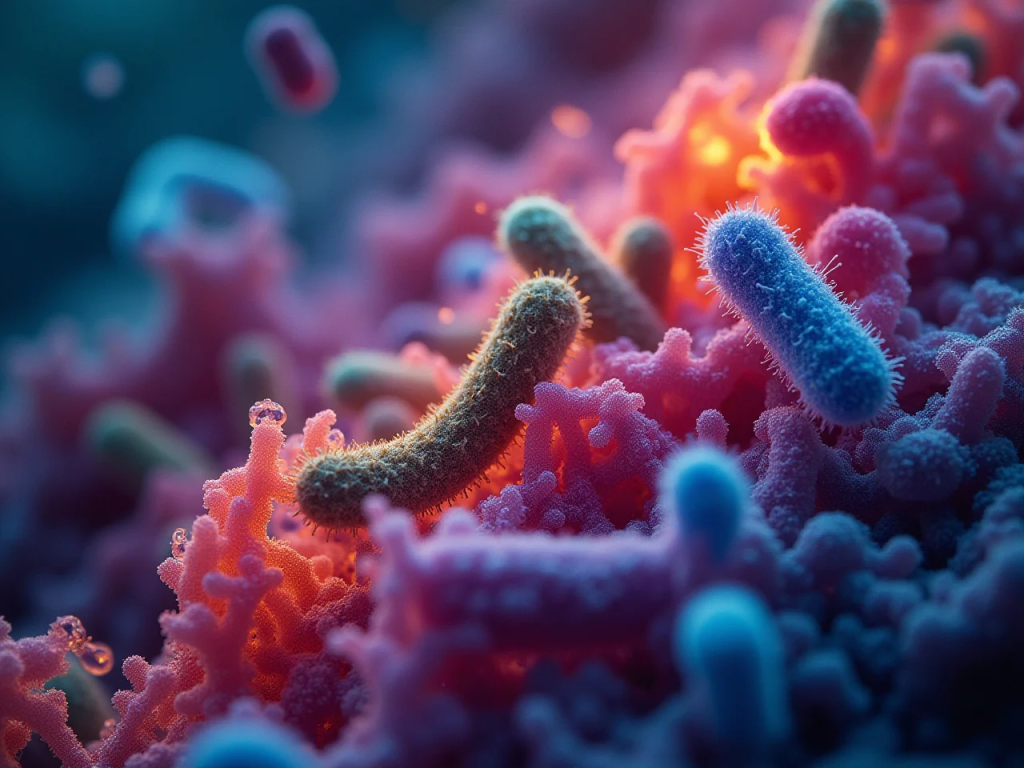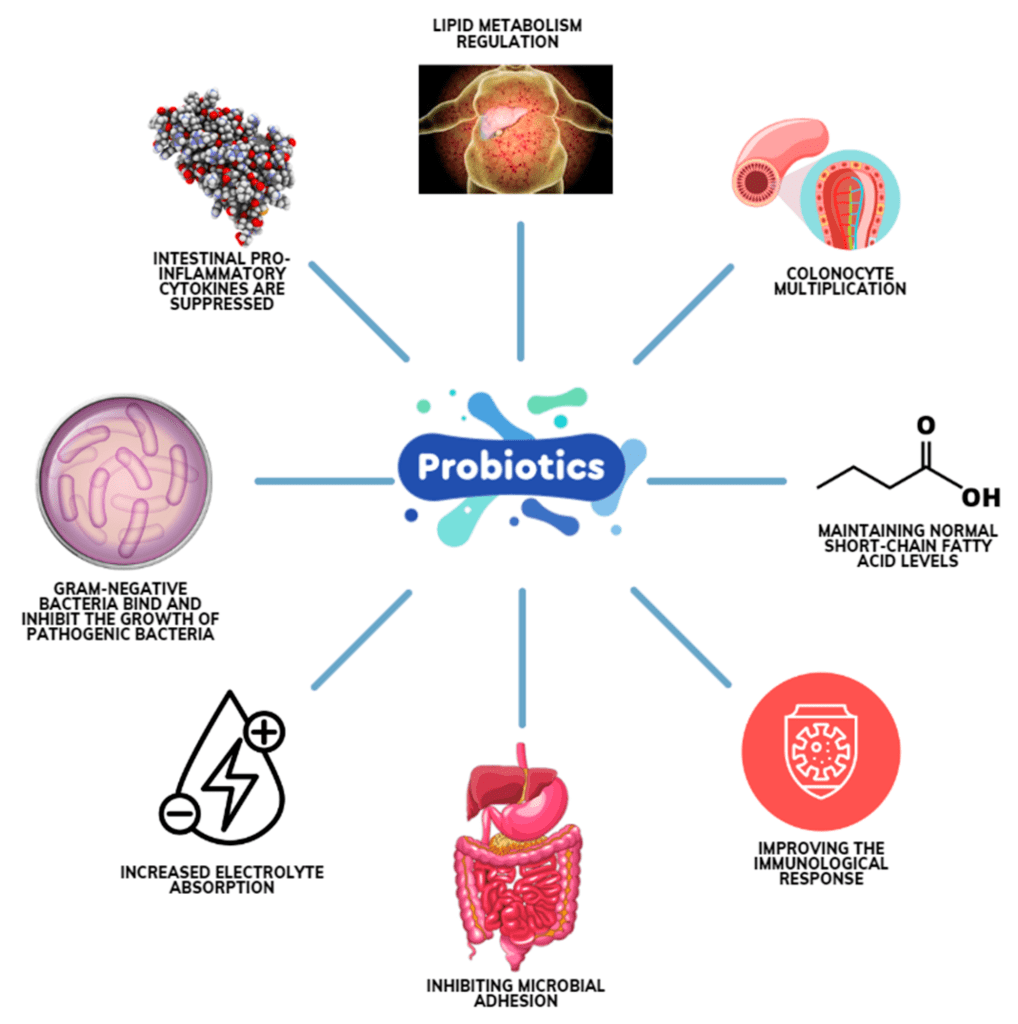Gut health has become a hot topic, with probiotics, fermented foods, and herbal remedies widely promoted for improving digestion. However, the conversation often presents a confusing contradiction: If probiotic foods promote good bacteria, wouldn’t antibacterial herbs like oregano destroy those beneficial microbes?
The truth is, gut health isn’t as simple as labeling bacteria as good or bad. Instead, the key lies in maintaining a balanced gut environment to prevent overgrowths that lead to bloating, heartburn, and other digestive issues. Let’s dive deeper into understanding how bacteria impact gut health and how you can eliminate harmful bacteria while protecting beneficial microbes.
The Role of Gut Bacteria in Digestion

Your gut is home to trillions of bacteria, some of which aid digestion, while others can cause problems when they multiply excessively. A well-balanced microbiome ensures that beneficial bacteria regulate digestion, support immune function, and prevent harmful microbes from taking over.
Think of your gut like a national park—every species plays a role. If one species overpopulates, the ecosystem falls out of balance. The same happens in your digestive system when certain bacteria overgrow due to poor diet, stress, or antibiotic use.
Common Culprits Behind Bloating and Heartburn
Several bacteria and yeasts can trigger bloating and acid reflux by fermenting food too aggressively or producing excess gas. Some of the most notorious ones include:
- H. pylori – A common cause of acid reflux, ulcers, and indigestion.
- Clostridium difficile (C. difficile) – Can lead to severe diarrhea and inflammation when overgrown.
- E. coli – While some strains are harmless, others cause bloating and stomach pain.
- Candida (Yeast Overgrowth) – A yeast that can disrupt digestion and lead to bloating, fatigue, and inflammation.
If these microbes become dominant, they can lead to chronic digestive discomfort, food intolerances, and even long-term health issues.
Video : How to Wipe Out Bad Bacteria in the Stomach
How to Eliminate Harmful Gut Bacteria Naturally
Instead of trying to kill off all bacteria, the key is to reduce overgrowths while maintaining balance. Here’s how you can do it:
1. Starve the Harmful Bacteria
Harmful bacteria thrive on sugar, refined carbs, and processed foods. By cutting these out, you make it harder for them to survive. Avoid:
- White bread, pasta, and pastries
- Sugary snacks and sodas
- Artificial sweeteners (which can disrupt gut bacteria)
Instead, opt for fiber-rich whole foods that nourish good bacteria, such as vegetables, legumes, and nuts.
2. Use Natural Antimicrobials
Certain herbs and spices help eliminate bad bacteria without wiping out beneficial microbes. Some of the best natural antibacterial agents include:
- Oregano oil – Powerful against bacterial overgrowths like SIBO (small intestinal bacterial overgrowth).
- Garlic – Contains allicin, which helps fight H. pylori and Candida.
- Thyme and rosemary – Act as natural antibiotics without disrupting gut flora balance.
- Berberine – A plant compound effective in eliminating harmful bacteria while supporting digestion.
These can be taken as supplements or used in cooking to support gut health.
3. Restore Balance with Probiotics and Prebiotics

Once harmful bacteria are under control, it’s essential to repopulate the gut with beneficial bacteria. Foods that help include:
- Probiotic-rich foods: Yogurt, kefir, sauerkraut, kimchi, and miso.
- Prebiotic foods: Bananas, onions, garlic, and oats (these feed beneficial bacteria).
For more severe bacterial imbalances, consider high-quality probiotic supplements that contain strains like Lactobacillus and Bifidobacterium, which support digestion and immune function.
Signs That Your Gut Bacteria Is Out of Balance
How do you know if bad bacteria have taken over your gut? Here are some common symptoms:
- Chronic bloating and gas – Persistent bloating is often caused by bacterial fermentation in the intestines.
- Acid reflux and heartburn – H. pylori overgrowth can trigger excessive stomach acid.
- Frequent indigestion and stomach pain – Could indicate an imbalance in digestive bacteria.
- Fatigue and brain fog – Harmful bacteria produce toxins that affect energy levels and mental clarity.
- Frequent yeast infections or fungal issues – Candida overgrowth can manifest in skin and nail infections.
If you notice multiple symptoms, addressing gut bacteria might be the solution.
Lifestyle Habits That Support a Healthy Gut
Aside from diet, certain lifestyle habits can prevent harmful bacteria from taking over:
1. Stay Hydrated
Drinking enough water helps flush out toxins and supports healthy bowel movements, preventing bacteria from stagnating in the gut.

2. Reduce Stress
Chronic stress alters gut bacteria and increases inflammation. Practices like meditation, deep breathing, and regular exercise can help restore gut balance.
3. Get Enough Sleep
Poor sleep can disrupt gut bacteria and increase cravings for sugary, processed foods, which feed harmful microbes. Aim for 7-9 hours per night.
4. Avoid Overusing Antibiotics
Antibiotics kill both good and bad bacteria, disrupting gut balance. Only take them when absolutely necessary and follow up with probiotics to restore healthy bacteria.
When to Seek Medical Help
While most bacterial imbalances can be managed naturally, there are times when you should see a doctor:
- Severe or persistent bloating and abdominal pain
- Unexplained weight loss
- Chronic diarrhea or constipation
- Symptoms of an H. pylori infection (constant acid reflux, nausea, stomach ulcers)
A medical professional can run gut microbiome tests or perform a stool analysis to determine if harmful bacteria are causing your symptoms.
Video : How to Kill The Bacteria Causing Heartburn And Bloating!
Final Thoughts: The Key to a Healthy Gut
Eliminating harmful gut bacteria isn’t about destroying all microbes—it’s about restoring balance.
By making simple dietary changes, incorporating natural antimicrobials, and supporting beneficial bacteria, you can:
✔ Reduce bloating and acid reflux
✔ Improve digestion and nutrient absorption
✔ Boost immunity and energy levels
✔ Prevent chronic gut-related issues
Taking care of your gut is one of the most important things you can do for your overall health. Start making small changes today, and your digestive system will thank you!
Howie Mandel reveals he’s ‘incredibly medicated,’ admits mental health struggles are ‘absolute hell’

renowned for saying “don’t touch me” a lot.When Howie Mandel gave Reba McEntire a firm hug on The Voice stage in September 2023, it stunned everyone.
The comedian caved in to his excitement and was unable to resist the country music star’s allure because he suffers from a crippling phobia of germs.
Mandel appears upbeat and joyful when he is in the spotlight, but when he is not, he discloses that he is a “scared” guy who would rather live “in the fetal position.”
Furthermore, he just made a startling admission that disclosed how he controls the OCD that drives him to “absolute hell.”To find out more, continue reading!

Many people’s inner germaphobe was let loose by the horror of the global epidemic, making them more aware of the risks of contamination.
While many people’s fear of germs passed after a few years, for others it remains crippling and never goes away.
“It is impossible for me to live a day in my life without thinking that we might not survive,” says Howie Mandel, a man who has experienced extreme anxiety and obsessive compulsive disorder (OCD) since he was a little child. The 68-year-old TV personality says the pandemic was particularly upsetting in an interview with People, saying, “But the comfort I would get would be the fact that everybody around me was okay.” It’s a good idea to hold on. However, everything in the world was not well throughout the pandemic. And it was just the worst.
OCD is defined as a “pattern of unwanted thoughts and fears known as obsessions” by the Mayo Clinic. These obsessions cause you to engage in compulsive activities, or repeating actions. These compulsions and obsessions are very distressing and interfere with day-to-day tasks.
“I’m in a bad dream,” declares the comedian who was born in Canada. “I attempt to ground myself. Mandel remarks, “I have a great family, including my wife Terry and their three children, Riley, Jackie, and Alex, who were married in 1980. “I adore what I do,” However, I can sometimes have periods of deep depression from which I cannot recover.
The best medicine is laughter.
Mandel, who got his big break on the medical drama St. Elsewhere in 1982, says that although every day is difficult, comedy gets him through it.
“I use humor as a coping mechanism. I’m crying if I’m not laughing. I haven’t been transparent enough about how dark and terrible things truly get.
Mandel continues, “I’m most at ease onstage,” adding that he uses humor to fend off the allure of OCD. And it’s not nice when I withdraw inside myself when I have nothing to do.

Mandel consistently finds time for projects, contributing his unmatched sense of humor to all of them. He hosts multiple shows in addition to acting as a judge on the America’s Got Talent (AGT) franchise.

“Very heavily medicated”
He opened up to Kelly Clarkson about his mental health concerns during a conversation they had on her talk show in 2022.
“I have OCD and am neurotic.people believe that because I’m out and about, I’m having fun and enjoying myself.I’m terrified. He said to the host, “I like to go home and just live in the fetal position.”
Clarkson retorted, “It’s so funny to me, because every time I’m around you, even seeing you out of work…you’re so the opposite of what I would think,” looking surprised by Mandel’s shadow persona.
Mandel chuckled, “I know, I’m such a joy, I’m a light, I’m an energy, and I’m stunning.” “..To be really honest, I take a lot of medication.
embracing Reba
He may have been excited to see Reba McEntire on The Voice because of that medicine.
Mandel, a panelist on the show, leaped from the audience and called her name. He then hurried up to the country music expert and said, “We’re right next door shooting the AGT finale.” Could you please sign my shirt?
After McEntire signed his “I [heart] Reba” shirt, Mandel gave an unexpected, tight hug to the audience.
Carson Daly, the show’s host, remarked of the man who usually avoids physical contact, “You don’t see that every day.”
Mandel acknowledges his perplexing actions, saying, “People notice discrepancies, particularly in the media.” “He shook someone’s hand,” or “Oh, he hugged someone.” I’m able to give you a handshake. Then I would believe that I hadn’t cleaned it thoroughly. And I would spend hours washing my hands by going back and forth in a circle.
He goes on, “I understand the funny in that,” determined to continue the discourse about mental health. But that doesn’t lessen how excruciatingly awful it is. I also don’t want to justify my emotional well-being. All I want is to keep it going.

Since Mandel was “boosted” and “vaccinated,” his Covid-19 was mild in 2022, serving as a reminder that being afraid of illness is insufficient to keep you safe.
How do you feel about Howie Mandel’s candor regarding his mental health? Kindly share this story with us and let us know what you think so we can start a discourse!



Leave a Reply